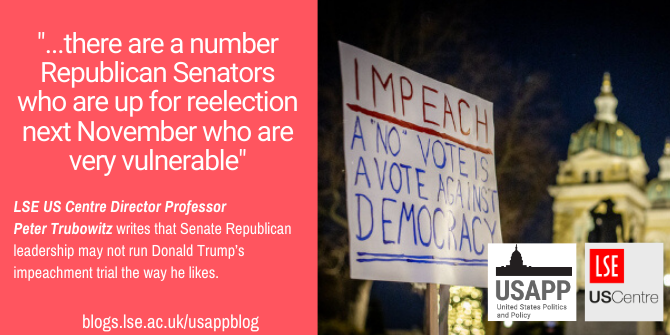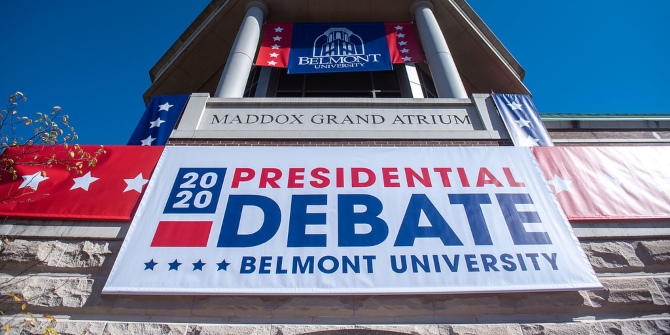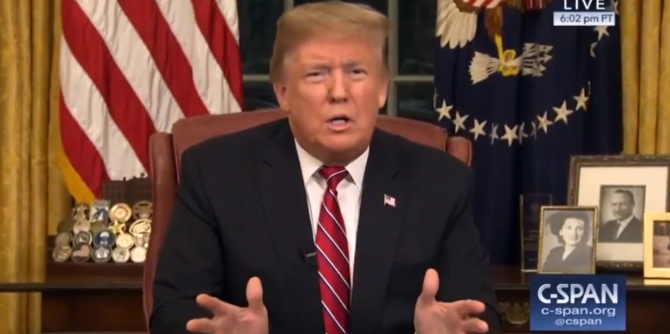 With the US House of Representatives’ vote to impeach President Trump, the process now moves to the Senate for trial. LSE US Centre Director Professor Peter Trubowitz writes that while the President is keen to hear from many witnesses in his trial, Senate Republicans may want to get things over with quickly, with little evidence taking.
With the US House of Representatives’ vote to impeach President Trump, the process now moves to the Senate for trial. LSE US Centre Director Professor Peter Trubowitz writes that while the President is keen to hear from many witnesses in his trial, Senate Republicans may want to get things over with quickly, with little evidence taking.
President Trump says that “poll numbers have gone through the roof in favor of “No Impeachment.” Is the President right?
No. Recent polling shows that impeaching Trump is pretty much a political draw. Trump’s hard Republican core is with him, and most Democrats are for impeachment and removal from office. More telling, of the 31 Democratic House seats that Trump won in 2016, the overwhelming majority voted for impeachment. Why? For two reasons: one substantive; the other political. The substantive reason is that the president crossed the line by tying military aid to Ukraine to dirt on a political opponent. The political reason: many of these swing districts are in the suburbs — the very place Republicans took a shellacking in the 2018 midterms. If you drill down into the polls what you find is suburban voters, especially women, are appalled by the president’s behavior.

“Impeachment Rally” by Phil Roeder is licensed under CC BY 2.0
Will President Trump be convicted in the Senate?
It is unlikely that two-thirds of the Senate will vote to convict the president. It could happen, but I think only if Senate Majority Leader Mitch McConnell agrees to run the trial the way Trump apparently wants it to be run: by calling lots of witnesses (e.g. Joe Biden, Hunter Biden, and Democratic House Intelligence Committee Chairman Adam B. Schiff of California. McConnell doesn’t want that. Why? Because there are a number Republican Senators who are up for reelection next November who are very vulnerable: Susan Collins (Maine), Cory Gardner (Colorado), Thom Tillis (North Carolina), and Martha McSally (Arizona). There are also Republican Senators (Lamar Alexander of Tennessee, Pat Roberts of Kansas, and Mike Enzi of Wyoming) who are retiring and might be more worried about their legacy than Trump’s fortunes. McConnell wants to avoid anything that might make it harder for three of these Senators (that’s all it would likely take) to vote with the Democratic minority in favor of a longer, evidence-based trial.
- This article is based on interview comments Professor Trubowitz gave to CNBC on 18 December 2019. Watch it here.
Please read our comments policy before commenting
Note: This article gives the views of the author, and not the position of USAPP– American Politics and Policy, nor of the London School of Economics.
Shortened URL for this post: http://bit.ly/2r5VbwC
About the author
 Peter Trubowitz – LSE US Centre
Peter Trubowitz – LSE US Centre
Peter Trubowitz is Professor of International Relations, and Director of the LSE’s US Centre. His main research interests are in the fields of international security and comparative foreign policy, with special focus on American grand strategy and foreign policy. He also writes and comments frequently on US party politics and elections and how they shape and are shaped by America’s changing place in the world.






